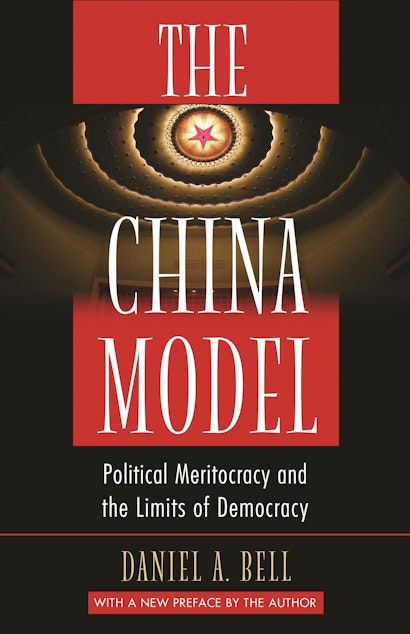Westerners tend to divide the political world into “good” democracies and “bad” authoritarian regimes. But the Chinese political model does not fit neatly in either category. Over the past three decades, China has evolved a political system that can best be described as “political meritocracy.” The China Model seeks to understand the ideals and the reality of this unique political system. How do the ideals of political meritocracy set the standard for evaluating political progress (and regress) in China? How can China avoid the disadvantages of political meritocracy? And how can political meritocracy best be combined with democracy? Daniel Bell answers these questions and more.
Opening with a critique of “one person, one vote” as a way of choosing top leaders, Bell argues that Chinese-style political meritocracy can help to remedy the key flaws of electoral democracy. He discusses the advantages and pitfalls of political meritocracy, distinguishes between different ways of combining meritocracy and democracy, and argues that China has evolved a model of democratic meritocracy that is morally desirable and politically stable. Bell summarizes and evaluates the “China model”—meritocracy at the top, experimentation in the middle, and democracy at the bottom—and its implications for the rest of the world.
A timely and original book that will stir up interest and debate, The China Model looks at a political system that not only has had a long history in China, but could prove to be the most important political development of the twenty-first century.
Awards and Recognition
- A Financial Times Summer Books Selection
- Selected as one of Financial Times (FT.com) Best Books of 2015
- A Guardian Best Holiday Reads of 2015 selection
"[I]t is part of the job of academics to ask fundamental questions that challenge conventional thinking. Bell performs this role admirably in lucid, jargon-free prose that leads the reader back to some of the most fundamental questions in political philosophy - refracted through the experience of contemporary China . . . I found the questions that Bell raised consistently stimulating."—Gideon Rachman, Financial Times
"Bell . . . has written a fascinating study. Open-minded readers will find it equips them with a more intelligent understanding of Chinese politics and, no less valuable, forces them to examine their devotion to democracy. . . . [The China Model] isn't just for those who want to better understand China. More than anything I've read for a while, it also forced me to think about what's good and bad about Western systems of government. From start to finish the book is a pleasure and an education."—Clive Crook, Bloomberg View
"Bell makes a solid and worthy case for why the outside world might want to think about the Chinese experiment in governance a bit more deeply. . . . This is a very clearly written book."—Kerry Brown, Asian Review of Books
"The China Model . . . is as important for us as it is for China. If the book brings us some humility about the ways in which an undemocratic model like China's can be deeply rooted in history and culture, it will have done good work. But it will do something better if it can remind us that our own history isn't over."—Rob Goodman, POLITICO
"In careful, clear and measured prose, [Bell] works hard to overcome prejudice, defuse emotions and discuss the pros and cons in the cool language of political philosophy. This, perhaps, is the book's greatest contribution."—James Miller, Literary Review of Canada
"Serious re-evaluations of democracy are inhibited by two factors: fears about the alternatives turning sour and a century of educational indoctrination that makes imagining the alternatives a frightful exercise. Bell's book should be read as an antidote (or if you prefer, an elixir) to overcome these doubts."—Siddharth Singh, Mint
"This book is a welcome addition to the expanding literature on the emerging ‘China model'. . . . Bell's argument, based on his long-term observation of China's political development, provides a nuanced, thought-provoking view of the meritocratic aspects of the Chinese system that have been obscured by the broad label ‘authoritarianism.' It offers an original explanation for the resilience of the Chinese regime and essentially challenges the widely held notion that liberal democracy is the universally desirable political outcome for modern societies."—Choice
"Bell is not an apologist for China but someone who teaches us to ask different questions. And these questions are fascinating."—Mariana Mazzucato, Financial Times
"A must-read scholarly account of China's political development with stimulating questions, powerful analysis as well as theoretically relevant arguments."—Bingdao Zheng, Chinese Political Science Review
"This book is a must-read text for all political scientists, in particular, for those who study democracy and democratization. It can open their eyes and help them to move out of their comfort zone to
examine the tough and pressing issues in the real world in which democracy and meritocracy must be combined to improve democratic government and solve many practical issues."—He Baogang, Perspectives in Politics
"A deeply stimulating contribution to normative political theory."—Thomas Pangle, Perspectives in Politics
"In conclusion, Bell's book is interesting and intriguing. It argues convincingly that every political system is a trade-off, and asks important questions about the US (electoral) democracy and Chinese (communist) meritocracy. Bell also develops his own model, combining elements from both."—Dao
"A must-read scholarly account of China's political development with stimulating questions, powerful analysis as well as theoretically relevant arguments. The discussion of political elite-recruiting system impressively spans thousands of years, from ages of empires to nowadays, and a number of countries and regions including United States, China, Singapore, Hong Kong and Taiwan among others. One has to admire the comparative perspective the author puts in various historical periods and social contexts."—Bingdao Zheng, Chinese Political Science Review
"A very well-written book that presents original scholarship."—Zhiming Cheng, Political Studies Review
"Reading Bell is rewarding. . . . This book is more than a bold challenge to democracy: it serves as a sincere invitation to a sober and less ideologically loaded dialogue between East and West."—Tao Wang, Asian Journal of Comparative Politics
"A sophisticated and sincerely empathetic corrective to the absolutism and triumphalism of an unquestioned faith in American-style electoral democracy."—Paul Evans, Pacific Affairs
"For many Western readers, Daniel Bell's book will be hard to digest because it calls into question 'fundamental truths.' For Chinese readers, Bell's book will assure them that at least some Westerners understand them. Over many centuries, right down to the present, the institution that Chinese people have held in highest regard is their examination system, because it is meritocratic and objective. This regard for individual achievement has always been coupled to a moral obligation to serve one's community. The China Model explains how this duality continues to operate at the heart of modern China."—George Yeo, former foreign affairs minister of Singapore
"Rarely is there a book so powerful in its analysis, timely in its topic, and relevant in its thinking. Combining his intellectual training in the West and teaching and research experience in China, Daniel Bell explains the development of China's hybrid political regime—an integration of Chinese meritocracy with components of Western democracy. This illuminating book should be read by those who are interested in China and by those who care about the future of Western democracies."—Zheng Yongnian, director of the East Asian Institute, National University of Singapore
"Whether China has found a genuinely new approach to governance, and how well that model works, are crucial questions. Daniel Bell's assessment will be surprisingly positive for many readers, and is more upbeat than my own—but it is carefully argued and must be considered by any serious student of today's China."—James Fallows, author of China Airborne
"In Western countries it would normally be anathema even to question the one-person–one-vote rule. But Daniel Bell does just that. In a Confucian spirit, he argues vigorously for meritocratic governance, and believes that popular democracies cannot solve our most vexing problems. There is much to learn from this deeply provocative book."—Mathias Risse, Harvard University
"This is a highly provocative book from a Western scholar who, in his own words, derives his intellectual inspiration from Confucianism. I am, without apology, from a radically different political tradition. But there is real merit in understanding how the modern Chinese Communist Party theorizes about its own tradition of ‘political meritocracy' within what it describes as the ‘China model.'"—Kevin Rudd, former prime minister of Australia
"The China Model is a timely, highly original, and hugely important book. Based on excellent knowledge of current political theories and a deep understanding of manifold peculiarities regarding China's constantly evolving political system, this book will be widely read by political science students, sinologists, and all those who are interested in the rise of China."—Yuri Pines, author of The Everlasting Empire


